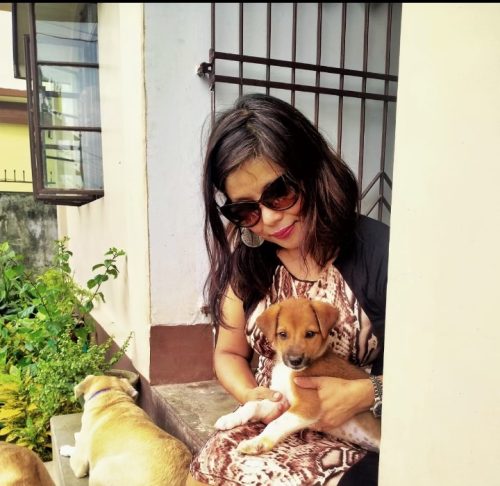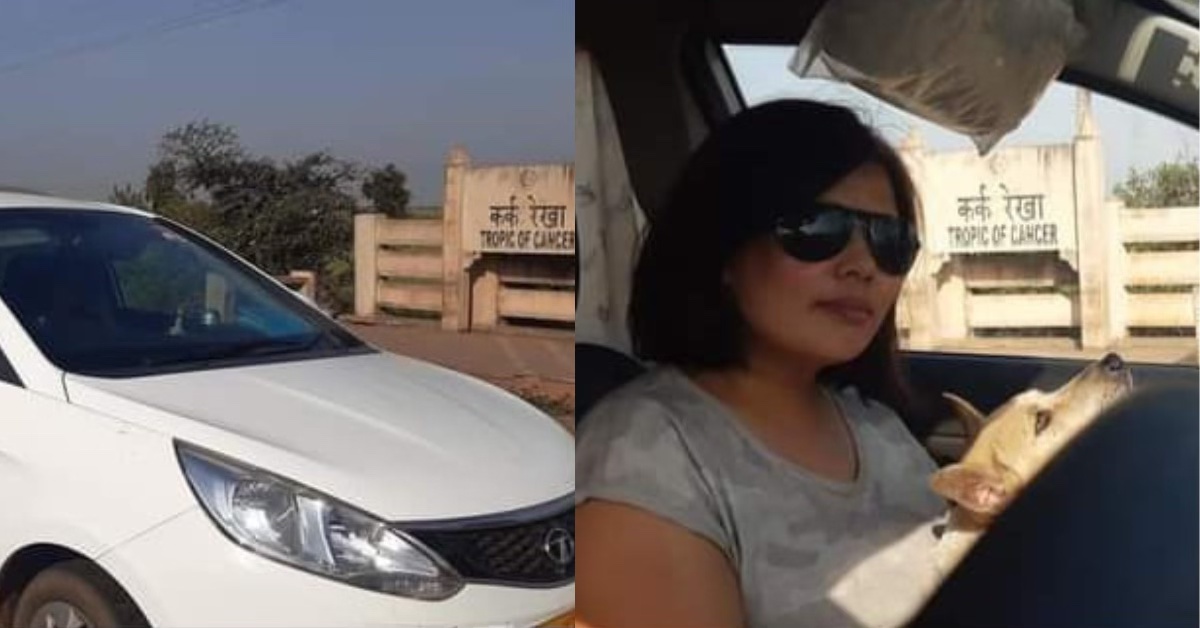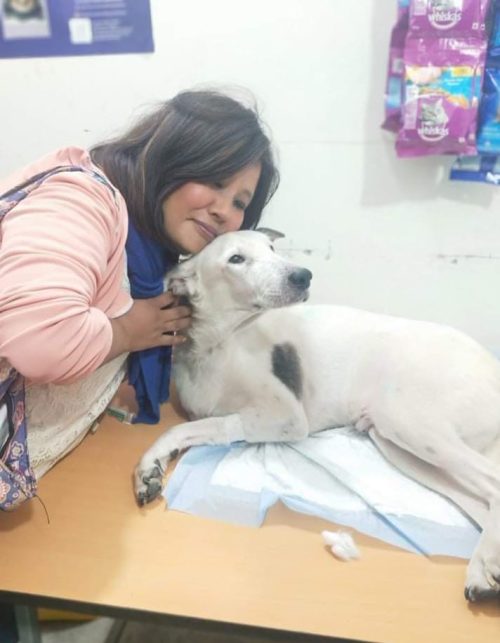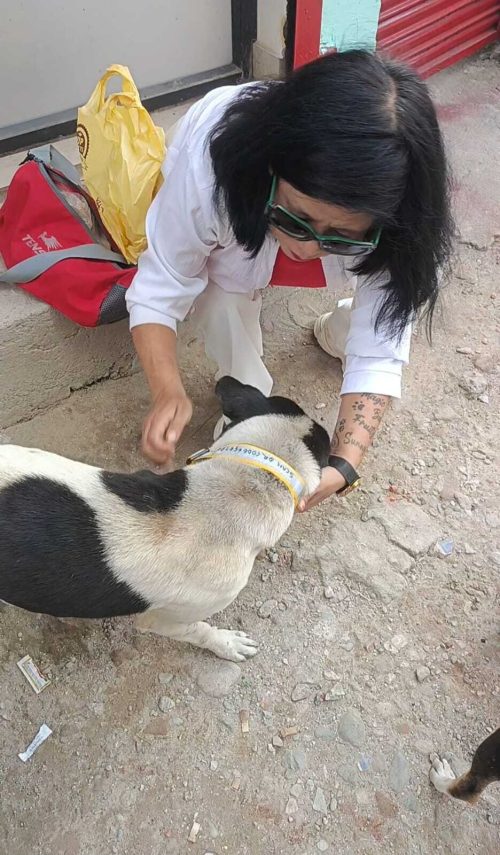“The greatness of a nation and its moral progress can be judged by the way its animals are treated.” — Mahatma Gandhi
Chandrika Yolmo Lama is a soft-spoken, compassionate woman, who could be mistaken for any other householder in West Bengal’s Siliguri. But beneath her calm exterior is the heart of a warrior — who has dedicated her life to rescuing and rehabilitating street dogs in her community. Her story is one of profound empathy, unwavering commitment, and a deep sense of responsibility that drives her to care for over 70 stray dogs every single day.
Married to an officer of the Indian Army, the 50-year-old has travelled to several parts of the country, including Jabalpur, Lucknow, and Goa. With an MPhil in economics, she has, over the last decade, served as a principal at two Army schools and the GD Goenka school in Uttar Pradesh’s Aligarh. However, in the last three years, she dedicated her life to cater to the voiceless, having rescued over 200 stray dogs from succumbing to disease and injury.
Advertisement

Chandrika’s day starts with an 8 km walk to cater to the needs of over 70 stray dogs
“This is what I want to do for the rest of my life,” Chandrika tells The Better India.
Her day starts with a 4.30 am walk; while most would consider this simply a part of their morning routine, for Chandrika, it’s the beginning of a mission — to ensure every stray she meets on her path is well-fed and catered to. She ensures that these , attention, and treatment they deserve, creating a safer, more compassionate world — one rescue at a time.
Chandrika’s journey into began long before she arrived in Siliguri. In fact, it started nearly two decades ago when she and her husband, Lieutenant Colonel Lakpa Yolmo Lama, were first posted to Hisar, Haryana, in 2000. A career educator with a heart for animals, Chandrika found herself adopting a street dog while stationed there. Over time, her compassion grew, and her blossomed into a full-time commitment.
Advertisement
“My husband and I have always had pets, and that sparked my love for animals,” she explains, sitting comfortably in her home in Salbari, where she has housed some of her rescued dogs. “When we started moving around, I began noticing the stray animals everywhere. I felt compelled to do something,” she adds.
In the beginning, it was small acts of kindness — feeding strays, offering them shelter when they needed it, and occasionally adopting those who were most in need. Over time, this humble commitment turned into a full-blown rescue operation. “I began feeding street dogs regularly, and when I saw a dog that was injured or sick, I would do what I could to help them,” she says.

Chandrika travelled by road from Lucknow to Goa, and then from Goa to Siliguri, covering over 5,000 km with her 12 rescued pups
When Chandrika needed to move to Goa from Lucknow, she had a pack of 12 strays she had adopted. She made the entire journey by road to ensure her dogs remained comfortable and with her. The dogs accompanied her to Siliguri as well, covering over 2,500 kilometres by road this time around as well. “Currently, there are 10 rescued dogs in my house,” she says.
Advertisement
But in Siliguri, her mission faced new challenges. “We have a flat near the North Bengal Medical College and Hospital (NBMCH), but I was soon running into trouble with society members,” she explains. “They weren’t comfortable with the number of dogs I had. So, I decided to rent a separate house just for them in Salbari.”
Salbari, a suburb in the picturesque city, has remained home to a sizable population of in people’s homes. Chandrika soon realised that many of the strays she encountered were suffering from serious illnesses and injuries, which were often left untreated due to a lack of resources or awareness in the community.
That’s when she decided to take matters into her own hands, creating what would, in July this year, become her rescue, treatment, and relief centre — Indie RTR.
Advertisement
For funds, Chandrika relies on family and friends and avoids appealing for monetary support. “People often approach me, wanting to donate food, rice, or other items for the dogs. I am happy to receive these contributions in kind, but I prefer not to accept cash donations. I have seen a lot of exploitation in fundraising, so I ensure that all funds are used directly for the care of the animals,” she shares.
After moving out of the NBMCH area, Chandrika initially rented a flat in Patharghata, another suburb of the city. It was in this house that she established the — a place where sick and injured animals are treated and rehabilitated before being released back into their original locations.
She continued with her morning walks, carrying bags of food, biscuits and medicines — feeding and treating every stray dog she encountered in the four-kilometre stretch between her residence and the Mayfair Tea Factory. “If I see an injury or a sickness, I treat the animal on the spot. It’s a quick way to prevent the issue from becoming serious and expensive to treat later,” she shares.
“In one of my morning walks, I was approached by a kind gentleman, who, on learning about what I do, offered me his space to open a relief centre free of cost,” she recalls with a gratitude-filled smile.
“When I first saw her on the street, I was out for my usual morning walk at 5 am,” says Mani Chhetri, the owner of the house. “I had seen her many times before, helping every dog she came across. She would feed them, treat them, and do everything on her own.”
Mani was thoroughly impressed by the compassion one woman could show and the resolve with which she continued her mission. “If any dog was sick or injured, whether from an accident or something else, she would take care of them. From my heart, I felt she was doing something really special for these animals,” he shares.

Currently, Chandrika and her small team caters to the needs of stray dogs all across the city
During an interaction with Chandrika, Mani came to know that she was renting a place to cater to numerous dogs that needed special care. “At that moment, I thought to myself, ‘I want to help.’ So, I offered her a space on my premises for the rescue centre. It’s heartwarming to see that while she is doing something good, she is also receiving help. If you have humanity, you will always want to help others.”
Today, she and her group of supporters cater to stray dogs across the city. “Any call we get, we immediately send someone to pick up the dog. Treat them here, and release them back in the location once they’ve recovered,” Chandrika says.
Chandrika’s work hasn’t gone unnoticed by the local community. Among the supporters of her efforts are Alok Menon, and his wife, Shilpa, owners of a nearby gym. After having opened the gym, the couple was looking for a way to promote themselves, while at the same time, contributing to the local community they were a part of.
“A member of my gym, who is also a dog lover, told me about Mrs Lama. So, my wife and I went and met her,” Alok recalls.
“Right then and there, we decided to support her. Beyond the event, we decided to donate rice for the animals. The event itself was a success, and people also donated food and medication for the dogs,” he adds.
Alok’s gym in Siliguri recently hosted a fundraiser to support Chandrika’s work. The concept was simple: for every pull-up that a participant completed during the event, a small donation would be made towards Indie RTR.
“We wanted to give back to the community and raise awareness about the strays in the area,” Alok explains. “Our goal was modest, but we were pleasantly surprised with the response. The event was a success.”
“This event not only raised funds but also educated people about the importance of caring for street animals,” Chandrika shares.
Over the past three years, Chandrika’s work has become a beacon of hope for many street animals in the area. But even with the support of her husband and a handful of caregivers, the work can be overwhelming. To manage the increasing number of rescues, Chandrika introduced an innovative system: QR code collars.

Every rescued dog is provided a collar with a QR code containing all their medical details
“The idea came to me as a way to keep track of the animals we rescue,” she explains. “We place QR codes on the dogs after they’ve been treated. When someone scans it, they can see the dog’s medical history and our contact information. It helps raise awareness and allows us to keep track of the animals we care for.”
Chandrika has also employed two women — Akriti Subba and Rakhi Gurung — to help her in her mission. “I pay them a very modest salary. They are also die-hard animal lovers and have been incredibly supportive, reaching out to me to join the mission.”
Chandrika’s efforts align with a broader movement in India to prevent cruelty towards stray animals, particularly dogs.
In 2016, the Supreme Court of India issued directives urging municipalities to treat stray dogs humanely, making provisions for their sterilisation, and calling for laws to protect them from harm.
The — notified by the Central Government under the Prevention of Cruelty to Animals Act, 1960 — mandating the sterilisation and immunisation of stray dogs by local authorities, also explicitly creates provisions for the humane treatment of stray animals.
Chandrika wants all animal lovers to continue creating awareness for a future generation that would be more compassionate towards animals, and for those who aren’t fond of animals, she has one request: “If you can’t love them, feed them; at least don’t hurt them.”
Edited by Pranita Bhat; Images courtesy Chandrika Yolmo Lama
Chandrika Yolmo Lama is a soft-spoken, compassionate woman, who could be mistaken for any other householder in West Bengal’s Siliguri. But beneath her calm exterior is the heart of a warrior — who has dedicated her life to rescuing and rehabilitating street dogs in her community. Her story is one of profound empathy, unwavering commitment, and a deep sense of responsibility that drives her to care for over 70 stray dogs every single day.
Married to an officer of the Indian Army, the 50-year-old has travelled to several parts of the country, including Jabalpur, Lucknow, and Goa. With an MPhil in economics, she has, over the last decade, served as a principal at two Army schools and the GD Goenka school in Uttar Pradesh’s Aligarh. However, in the last three years, she dedicated her life to cater to the voiceless, having rescued over 200 stray dogs from succumbing to disease and injury.
Advertisement

Chandrika’s day starts with an 8 km walk to cater to the needs of over 70 stray dogs
“This is what I want to do for the rest of my life,” Chandrika tells The Better India.
Her day starts with a 4.30 am walk; while most would consider this simply a part of their morning routine, for Chandrika, it’s the beginning of a mission — to ensure every stray she meets on her path is well-fed and catered to. She ensures that these , attention, and treatment they deserve, creating a safer, more compassionate world — one rescue at a time.
Passion turns into purpose
Chandrika’s journey into began long before she arrived in Siliguri. In fact, it started nearly two decades ago when she and her husband, Lieutenant Colonel Lakpa Yolmo Lama, were first posted to Hisar, Haryana, in 2000. A career educator with a heart for animals, Chandrika found herself adopting a street dog while stationed there. Over time, her compassion grew, and her blossomed into a full-time commitment.
Advertisement
“My husband and I have always had pets, and that sparked my love for animals,” she explains, sitting comfortably in her home in Salbari, where she has housed some of her rescued dogs. “When we started moving around, I began noticing the stray animals everywhere. I felt compelled to do something,” she adds.
In the beginning, it was small acts of kindness — feeding strays, offering them shelter when they needed it, and occasionally adopting those who were most in need. Over time, this humble commitment turned into a full-blown rescue operation. “I began feeding street dogs regularly, and when I saw a dog that was injured or sick, I would do what I could to help them,” she says.

Chandrika travelled by road from Lucknow to Goa, and then from Goa to Siliguri, covering over 5,000 km with her 12 rescued pups
When Chandrika needed to move to Goa from Lucknow, she had a pack of 12 strays she had adopted. She made the entire journey by road to ensure her dogs remained comfortable and with her. The dogs accompanied her to Siliguri as well, covering over 2,500 kilometres by road this time around as well. “Currently, there are 10 rescued dogs in my house,” she says.
Advertisement
But in Siliguri, her mission faced new challenges. “We have a flat near the North Bengal Medical College and Hospital (NBMCH), but I was soon running into trouble with society members,” she explains. “They weren’t comfortable with the number of dogs I had. So, I decided to rent a separate house just for them in Salbari.”
Salbari, a suburb in the picturesque city, has remained home to a sizable population of in people’s homes. Chandrika soon realised that many of the strays she encountered were suffering from serious illnesses and injuries, which were often left untreated due to a lack of resources or awareness in the community.
That’s when she decided to take matters into her own hands, creating what would, in July this year, become her rescue, treatment, and relief centre — Indie RTR.
Advertisement
“It is not an NGO or a relief centre,” Chandrika clarifies, “Our mission is to rescue, treat and release the stray animals we encounter back to the location we brought them from.”
For funds, Chandrika relies on family and friends and avoids appealing for monetary support. “People often approach me, wanting to donate food, rice, or other items for the dogs. I am happy to receive these contributions in kind, but I prefer not to accept cash donations. I have seen a lot of exploitation in fundraising, so I ensure that all funds are used directly for the care of the animals,” she shares.
Kindness invites kindness
After moving out of the NBMCH area, Chandrika initially rented a flat in Patharghata, another suburb of the city. It was in this house that she established the — a place where sick and injured animals are treated and rehabilitated before being released back into their original locations.
She continued with her morning walks, carrying bags of food, biscuits and medicines — feeding and treating every stray dog she encountered in the four-kilometre stretch between her residence and the Mayfair Tea Factory. “If I see an injury or a sickness, I treat the animal on the spot. It’s a quick way to prevent the issue from becoming serious and expensive to treat later,” she shares.
“In one of my morning walks, I was approached by a kind gentleman, who, on learning about what I do, offered me his space to open a relief centre free of cost,” she recalls with a gratitude-filled smile.
“When I first saw her on the street, I was out for my usual morning walk at 5 am,” says Mani Chhetri, the owner of the house. “I had seen her many times before, helping every dog she came across. She would feed them, treat them, and do everything on her own.”
Mani was thoroughly impressed by the compassion one woman could show and the resolve with which she continued her mission. “If any dog was sick or injured, whether from an accident or something else, she would take care of them. From my heart, I felt she was doing something really special for these animals,” he shares.

Currently, Chandrika and her small team caters to the needs of stray dogs all across the city
During an interaction with Chandrika, Mani came to know that she was renting a place to cater to numerous dogs that needed special care. “At that moment, I thought to myself, ‘I want to help.’ So, I offered her a space on my premises for the rescue centre. It’s heartwarming to see that while she is doing something good, she is also receiving help. If you have humanity, you will always want to help others.”
Today, she and her group of supporters cater to stray dogs across the city. “Any call we get, we immediately send someone to pick up the dog. Treat them here, and release them back in the location once they’ve recovered,” Chandrika says.
A gym’s unique initiative
Chandrika’s work hasn’t gone unnoticed by the local community. Among the supporters of her efforts are Alok Menon, and his wife, Shilpa, owners of a nearby gym. After having opened the gym, the couple was looking for a way to promote themselves, while at the same time, contributing to the local community they were a part of.
“A member of my gym, who is also a dog lover, told me about Mrs Lama. So, my wife and I went and met her,” Alok recalls.
“We were truly inspired by what she had been doing for the past few years. Every morning, she walks 8 to 9 kilometres to feed the strays. I thought, ‘This is above and beyond’. While many people help animals, it’s usually on a smaller scale. She was doing something extraordinary.”
“Right then and there, we decided to support her. Beyond the event, we decided to donate rice for the animals. The event itself was a success, and people also donated food and medication for the dogs,” he adds.
Alok’s gym in Siliguri recently hosted a fundraiser to support Chandrika’s work. The concept was simple: for every pull-up that a participant completed during the event, a small donation would be made towards Indie RTR.
“We wanted to give back to the community and raise awareness about the strays in the area,” Alok explains. “Our goal was modest, but we were pleasantly surprised with the response. The event was a success.”
“This event not only raised funds but also educated people about the importance of caring for street animals,” Chandrika shares.
Introducing QR codes
Over the past three years, Chandrika’s work has become a beacon of hope for many street animals in the area. But even with the support of her husband and a handful of caregivers, the work can be overwhelming. To manage the increasing number of rescues, Chandrika introduced an innovative system: QR code collars.

Every rescued dog is provided a collar with a QR code containing all their medical details
“The idea came to me as a way to keep track of the animals we rescue,” she explains. “We place QR codes on the dogs after they’ve been treated. When someone scans it, they can see the dog’s medical history and our contact information. It helps raise awareness and allows us to keep track of the animals we care for.”
Chandrika has also employed two women — Akriti Subba and Rakhi Gurung — to help her in her mission. “I pay them a very modest salary. They are also die-hard animal lovers and have been incredibly supportive, reaching out to me to join the mission.”
‘If you can’t love them, at least don’t hurt them’
Chandrika’s efforts align with a broader movement in India to prevent cruelty towards stray animals, particularly dogs.
In 2016, the Supreme Court of India issued directives urging municipalities to treat stray dogs humanely, making provisions for their sterilisation, and calling for laws to protect them from harm.
The — notified by the Central Government under the Prevention of Cruelty to Animals Act, 1960 — mandating the sterilisation and immunisation of stray dogs by local authorities, also explicitly creates provisions for the humane treatment of stray animals.
Apart from prohibiting the killing of dogs, the ABC Rules, 2023, also prevent the relocation of any stray dog from their areas of residence. Additionally, the Rules address feeding arrangements for stray animals, requiring Resident Welfare Associations or Apartment Owner Associations to designate feeding spots and times to minimise conflicts with residents.
Chandrika wants all animal lovers to continue creating awareness for a future generation that would be more compassionate towards animals, and for those who aren’t fond of animals, she has one request: “If you can’t love them, feed them; at least don’t hurt them.”
Edited by Pranita Bhat; Images courtesy Chandrika Yolmo Lama
